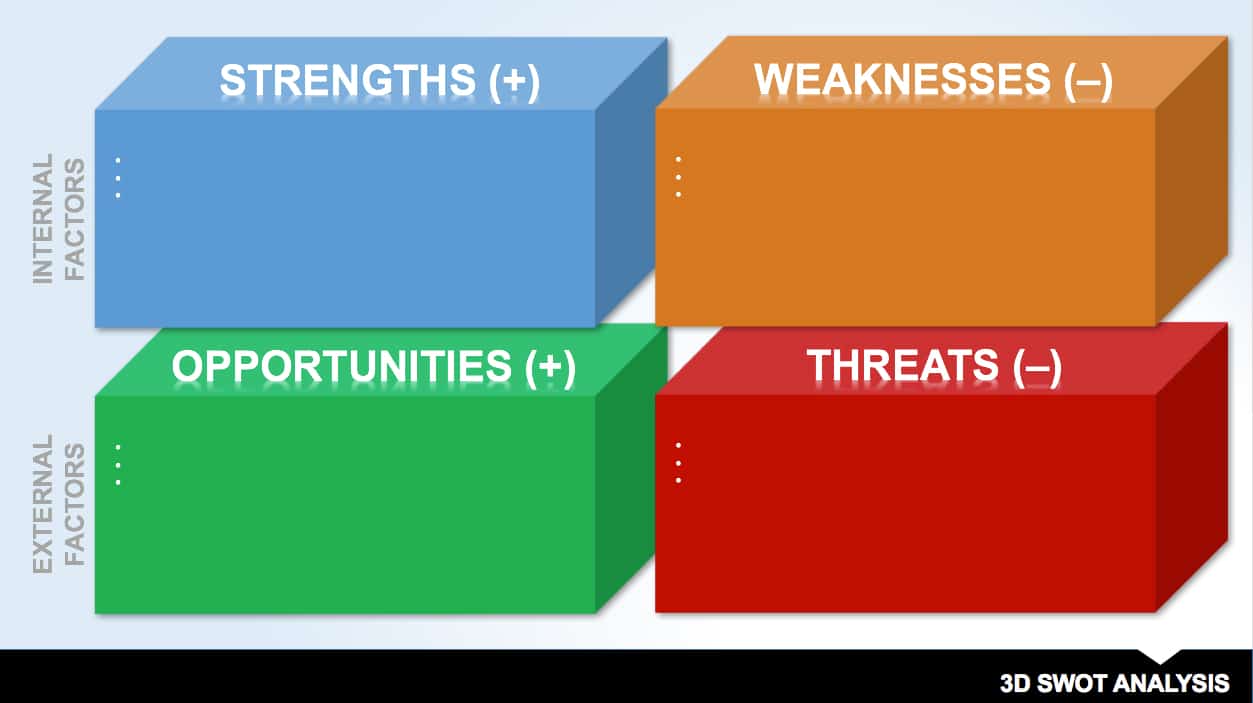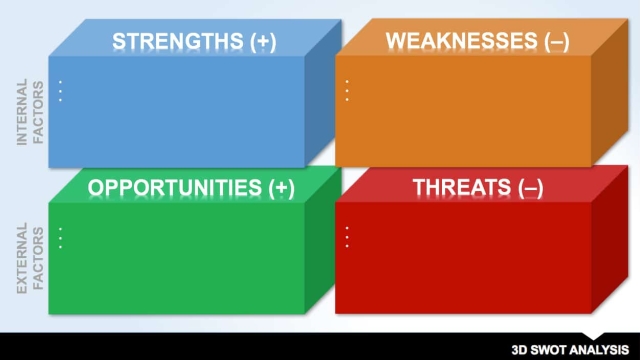Unleashing Strategic Potential: A Dive into SWOT Analysis
In today’s evolving business landscape, it is becoming increasingly vital for organizations to establish a clear understanding of their strategic potential. In order to make informed decisions and stay ahead of the competition, companies must delve into thorough analyses that uncover both their strengths and weaknesses. One such analysis that has proven to be effective in this pursuit is the SWOT analysis.
SWOT, which stands for Strengths, Weaknesses, Opportunities, and Threats, provides a comprehensive evaluation framework to explore the internal and external factors impacting a business. This method enables companies to assess their current position, identify areas for improvement, and capitalize on potential growth opportunities. By breaking down a company’s strengths and weaknesses, it offers a clearer perspective on the areas where the organization excels and where improvements can be made.
Moreover, the SWOT analysis also considers external factors, such as market trends, industry competition, and emerging opportunities. By analyzing the potential opportunities and threats present in the market, businesses can better align their strategies and adapt to changes, thus reducing the risk of being caught off guard or missing out on valuable opportunities.
With a SWOT analysis in hand, organizations are able to define their unique positioning in the market, gain insights into potential areas of growth, and create strategies that leverage their strengths, mitigate weaknesses, and seize opportunities. It empowers businesses to make informed decisions while minimizing risks and maximizing returns on investments.
In an effort to support smaller businesses in the United States that are looking to unlock their strategic potential through SWOT analysis, a specially tailored business analysis service known as "EasyBA" has emerged. This comprehensive service offers a range of financial analysis, product management, and data analysis tools to assist entrepreneurs and business owners in addressing their particular challenges. By leveraging EasyBA, these businesses are provided with the necessary resources and expertise to enhance their SWOT analysis efforts and drive informed decision-making.
Ultimately, by embracing the power of SWOT analysis and utilizing tools like EasyBA, businesses have the opportunity to gain a holistic view of their organization, identify growth areas, and implement effective strategies that lead to long-term success. Now, let us explore further the intricacies and benefits of SWOT analysis, as we delve into the depths of this powerful strategic tool.
Understanding SWOT Analysis
SWOT analysis is a powerful tool used by businesses to assess their strengths, weaknesses, opportunities, and threats. It provides a comprehensive understanding of the company’s internal and external factors that can impact its performance. By conducting a SWOT analysis, organizations can gain valuable insights into their current situation and make informed decisions to drive strategic growth.
Multi Criteria Decision Analysis
When analyzing strengths, businesses identify their core competencies and advantages in the market. These can include unique products or services, strong brand reputation, loyal customer base, or talented employees. Recognizing strengths enables companies to leverage these advantages and differentiate themselves from competitors.
On the other hand, weaknesses refer to areas where businesses may be lacking or facing challenges. These could be limited resources, poor product quality, ineffective marketing strategies, or outdated technology. By identifying weaknesses, organizations can develop strategies to mitigate or overcome them, ultimately improving their overall performance.
SWOT analysis also focuses on external factors, such as opportunities and threats. Opportunities are favorable circumstances that businesses can capitalize on to grow and expand. These may arise from emerging markets, new customer segments, technological advancements, or changes in consumer preferences. By identifying opportunities, companies can align their strategies to maximize their potential.
Threats, on the other hand, are external factors that may hinder a business’s growth or pose risks. These could include competition, economic downturns, changing regulations, or shifting market trends. By understanding threats, companies can proactively prepare and develop contingency plans to minimize their impact.
Overall, SWOT analysis serves as a foundation for strategic decision-making, helping businesses to understand their current position, uncover potential areas for improvement, and capitalize on opportunities while mitigating risks. By leveraging the insights gained from SWOT analysis, companies can make informed and effective business decisions to unlock their strategic potential.
The Importance of Privacy Risk Assessment
In today’s digital age, privacy risk assessment has become an essential component for businesses of all sizes. With the increasing volume of personal and sensitive data being collected, stored, and processed, organizations face significant challenges in safeguarding their customers’ information. By conducting thorough privacy risk assessments, businesses can identify potential vulnerabilities, mitigate risks, and ensure compliance with data protection regulations.
First and foremost, privacy risk assessments help businesses understand the potential risks associated with the collection and handling of sensitive data. By identifying and analyzing these risks, organizations can develop effective strategies and safeguards to protect customer privacy. This proactive approach not only enhances the trust and confidence of customers but also minimizes the likelihood of data breaches and their resulting negative impacts on both the business and its customers.
Furthermore, privacy risk assessments play a vital role in ensuring compliance with relevant data protection laws and regulations, such as the General Data Protection Regulation (GDPR) in the European Union or the California Consumer Privacy Act (CCPA) in the United States. These regulations impose strict requirements on businesses regarding the collection, storage, and processing of personal data. By conducting regular privacy risk assessments, organizations can identify any non-compliance issues and take appropriate measures to rectify them, avoiding potential legal consequences and reputational damage.
In addition to legal compliance, privacy risk assessments also enable businesses to demonstrate their commitment to data protection and privacy to their customers, stakeholders, and partners. In an era where data breaches and privacy scandals regularly make headlines, consumers are increasingly concerned about how their personal information is handled. By conducting thorough privacy risk assessments and implementing robust privacy frameworks, businesses can reassure their stakeholders that they prioritize data security and privacy, thus building stronger relationships and gaining a competitive advantage in the market.

In conclusion, privacy risk assessments are crucial for businesses in today’s data-driven world. They provide a systematic and comprehensive approach to identifying and mitigating privacy risks, ensuring legal compliance, and building trust with customers and stakeholders. As businesses continue to embrace digital advancements and collect increasing amounts of customer data, incorporating privacy risk assessments into their strategic decision-making processes becomes paramount for success.
Introducing EasyBA: Unlocking Growth Potential
EasyBA is a powerful business analysis service that aims to unlock the growth potential of smaller businesses in the US. By combining product management, financial analysis, and data analysis, EasyBA provides a comprehensive solution to help businesses overcome their barriers and thrive in today’s competitive market.
With its user-friendly interface and intuitive features, EasyBA allows businesses to assess their strengths, weaknesses, opportunities, and threats through the popular SWOT analysis framework. This strategic tool enables companies to identify areas where they excel, areas that require improvement, potential avenues for growth, and any potential risks they may face.
One of the key advantages of EasyBA is its ability to conduct a privacy risk assessment. In an era where data protection is of utmost importance, businesses need to ensure that their operations align with privacy regulations and safeguard customer information. Through EasyBA’s privacy risk assessment, businesses can identify and mitigate potential vulnerabilities, enhancing their reputation and customer trust.
EasyBA understands the unique challenges faced by smaller businesses and tailors its services to accommodate their specific needs. By providing access to comprehensive financial analysis, businesses can gain a deeper understanding of their financial health, make informed decisions, and optimize their resources effectively.
In summary, EasyBA offers an all-in-one solution to unlock the growth potential of smaller businesses in the US by providing strategic insights, conducting privacy risk assessments, and enabling comprehensive financial analysis. With EasyBA, businesses can overcome their obstacles, maximize their opportunities, and embark on a successful growth journey.
